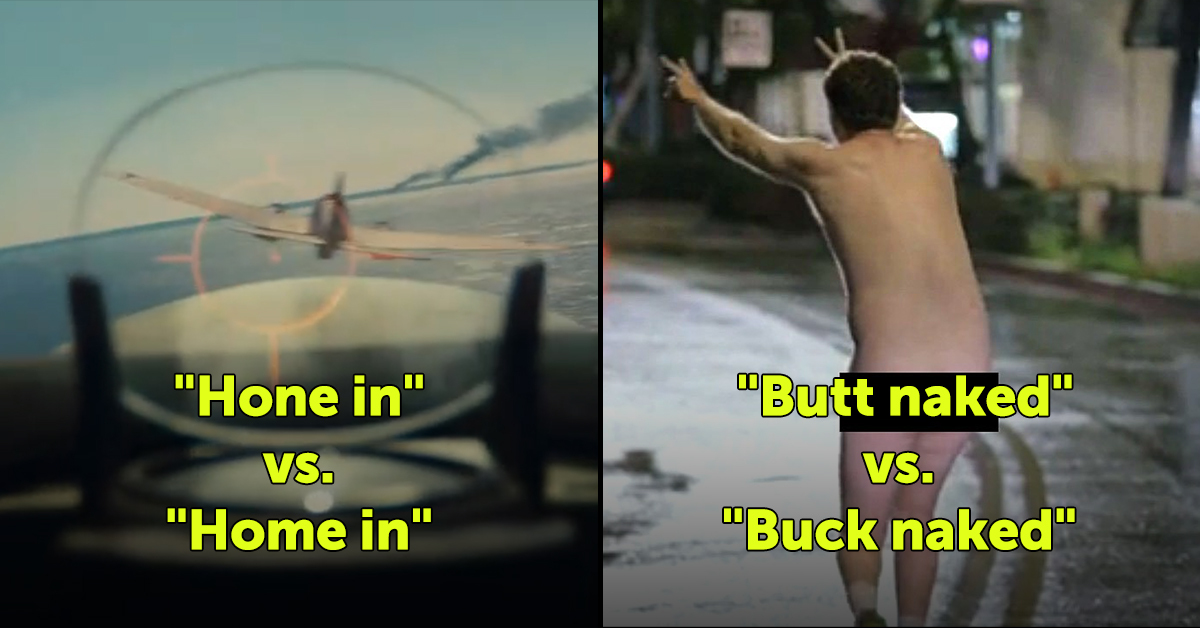Are You Saying These Common Phrases Incorrectly? Well, Stop It. (14 Phrases)
There are so many commonly misused phrases floating around out there. My dad is really creative with making up his own words and phrases for things so I frequently say a word that makes my friends say “uh Hannah… that’s not a thing.” Anyway, I was doomed from the start but there is still hope for you!
1. “On tender hooks” vs. “On tenterhooks”
Being on “tenterhooks” basically means you’re incredibly anxious about something that is about to happen, like a test or getting results back for something. A tenterhook was used by manufacturers to tightly pull the freshly milled fabric so it could dry properly. The correct phrase is: “On tenterhooks”
2. “Shoe-in” vs. “Shoo-in”
Being a “shoo-in” is someone who was guaranteed to win something. It comes from people shooing racehorses which made them run faster. The correct term is “Shoo-in.”
3. “You’ve got another thing coming” vs. “You’ve got another think coming”
I’ve never heard someone say “you’ve got another think coming” so this one is interesting! However, this phrase came before “you’ve got another thing coming” and was used to tell someone they were wrong and they needed to go think about it. These are both correct but “You’ve got another think coming” gets the edge because of seniority.
4. “Hunger pains” vs. “Hunger pangs”
They’re both technically correct, but the term “hunger pangs” is a medical term for hunger cramping in the stomach. The correct phrase is “Hunger pangs.”
5. “Pawn off” vs. “Palm off”
This phrase means to get rid of something. Pawning something off means to sell it at a pawn shop and palm off means to hide your cards in your hand while playing poker, which involves deception. The correct term here is “palm off.”
6. “Hone in” vs. “Home in”
I’ve heard both of these used frequently and both make sense. Home in is more common and it means to move toward something (think homing missiles). Hone in means to sharpen or make something more acute and is a less common term. The correct term is “Home in.”
7. “Slight of hand” vs. “Sleight of hand”
This is really just a misspelling of the word sleight. Sleight means “the use of dexterity or cunning, especially so as to deceive” and slight means a small movement. The correct term here is “Sleight of Hand.”
8. “Spitting image” vs. “Spit and image”
This one was the most surprising to me! I hear “spitting image” so often, I assumed it must be the correct phrase. However, the correct phrase here is “Spit and image,” referring to a child who looks so much like their parent, they could have spit the child out.
9. “Baited breath” vs. “Bated breath”
Bated is an abbreviation of the word abated and “Bated breath” was first used in Shakespeare’s Merchant of Venice. Abated means to lessen in severity or amount. Bated breath means to hold your breath. Baited breath means having bait in your mouth, which would stink and might make you bate your breath. The correct term here is “Bated Breath.”
10. “Free reign” vs. “Free rein”
“Free rein” means “unrestricted liberty of action or decision” and comes from the act of horseback riding and holding a horse’s reins loosely so that it can move how it chooses. “Free reign” means someone reigning however they please, and even though it makes sense, it’s not correct. The correct phrase here is “Free rein.”
11. “Change tact” vs. “Change tack”
“Change tact” is said to mean changing your approach to something with tact. The word “tack” is a nautical term meaning changing the direction of a boat so “change tack“ is the correct term here.
12. “Ex-patriot” vs. “Expatriate”
An expatriate is someone who no longer lives in their hometown. An “ex-patriot” is someone who has lost their patriotism for their country. They are both commonly misspelled and mixed up terms. The correct term here is “Expatriate.”
13. “Butt Naked” or “Buck Naked”
I’ve heard this both ways! I think older people tend to say buck naked more and I always think it sounds funny! And guess what, they’re right! The correct term here is “Buck naked,” for some reason.
14. “Chock it up” vs. “Chalk it up”
This phrase means to give credit to something or to attain something. “Chock” and “chalk” are both words. Something can be “chock-full” of something, but if you’re explaining why something happened, you would use “chalk.” So the correct phrase here is “Chalk it up.”

